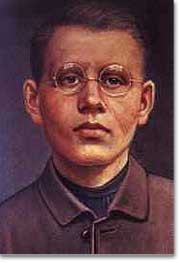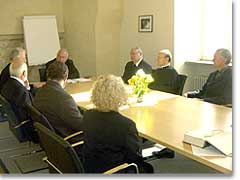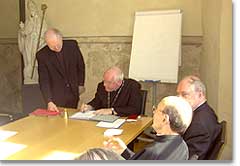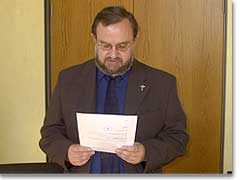 |
|
José Engling, heroe de la primera hora de Schoenstatt Joseph Engling, heroe sodalist Josef Engling, aus der Gründergeneration Schönstatts |
|
 |
|
Abertura del proceso complementario en Treveris Opening of the complementary process in Trier Eröffnung des Ergänzungsprozesses in Trier |
|
 |
|
Mons. Reinhard Marx, Obispo de Treveris, firmando Bishop Dr. Reinhard Marx, Trier, signing the document Bischof Dr. Reinhard Marx leistet die Unterschrift |
|
 |
|
P. Dr. Joachim Schmiedl: presentation Fr. Dr. Joachim Schmiedl: introduction Einführende Worte von P. Dr. Joachim Schmiedl Fotos: Schmiedl © 2005 |
|
SCHOENSTATT, MKF. A hero says yes to a noble cause and he is even willing to sacrifice his life for it. That is the reason that he is a brave, vigorous and perfect example. This is the definition that the Encyclopedia (online) Wkikpedia gives. "A Hero in daily life": he was known by this title during the decade of the 30’s and beyond, by a whole generation of young boys who have been in contact with Schoenstatt. For the youth of Paraguay, Ecuador, Brazil, Argentina… he is still a "hero"; Joseph Engling was the young man from the founding times of Schoenstatt who was willing to sacrifice his own life for a noble cause : Schoenstatt.. Currently in Trier the cause for his beatification is being studied.
On Monday, July 11, 2005, the official opening of the complementary process of beatification of Joseph Engling, took place in Trier. With the presence of the Diocesan Bishop, Monsignor Reinhard Marx, a tribunal of justice was constituted under the presidency of Monsignor Dr. Klaus Peters as Episcopal delegate, Professor, Dr. Maximilian Hommens as "promoter of justice" and two notaries: it has the task of presenting the questionnaire for the interrogation of witnesses. In addition a competent historic commission will be constituted that will gather and classify all the existing documentation of and about Joseph Engling. Why is Joseph Engling returning to Trier again?
The process of beatification had already begun in Trier in 1952
On October 4, 1952 the opening of the process of beatification for Joseph Engling took place in Trier, explained Father and Dr. Joachim Schmiedl. The vice-postulator, Father Alexander Menningen, could still interrogate many witnesses who knew Joseph Engling personally. On July 13, 1964, exactly 41 years ago, the process concluded in Trier. At the beginning of 1964 the documents were presented in Rome.
In the meantime they were translated to Italian.
Then course of the process was delayed because during the time that the documents were presented to the Congregation for the cause of saints, the decree for the separation between the Society of Catholic Apostolate (Pallotine Fathers) and the Schoenstatt Work became public. This also affected the extensive course of the process of Joseph Engling, who the Schoenstatt Movement venerates as the protagonist of the way of sanctity inspired by Father Joseph Kentenich.
His veneration continues…
His veneration continues in the sphere of the Movement and in the places that are related to his life, and also in other countries and continents: In the United States, Brazil and Paraguay, in Burundi and Australia. During the last years in Ermland, his native country, (which is now Polish territory) the young boys want to grow in relation to him. And the question that constantly arises: can a soldier of the first world war really be beatified in view of the changing position of the Church about the justification of war?
That is why there was great joy when in the year 2000 the Society of Catholic Apostolate, at the suggestion of its general postulator, Father Jan Korycki, took the initiative to take up the process again. A special sign was that a proposal was made to work in conjunction with the Pallotine Fathers and Schoenstatt and to name two vice-postulators: Father Vincent Reinhart SAC and Father Joachim Schmiedl.
The Congregation for the cause of saints demands a complementary process in the Diocese of Trier. At this time the documents of the historic commission, composed by Father and Professor, Dr. Paul Rheinbay and Father Heinrich M. Hug, should be gathered and examined. And it should be explained – that through the interrogation of witnesses – Joseph Engling’s fame of sanctity continues to the present time.
Acknowledged by the youth
During the session of the 11th of June, the Postulator of the Pallotine Father, Father Jan Korycke and both vice-postulators: Father Vincenz Reinhart and Father Schmiedl, as well as, the vice provincial of the Pallotines of Limburgo, Father Norbert Possmann, were present.
After the reading of the official document all the participants had to go through the swearing in process. The interrogation of witnesses regarding the continuing fame of sanctity will take place at the end of August. And although not all who venerate Joseph Engling will be invited to be present in Treir…everyone is invited to write to SCHOENSTATT.DE (pressoffice@schoenstatt.de) explaining what Joseph Engling means to them
A hero gives his entire self for a noble cause and is even willing to sacrifice his life for it. That is why he is a brave, vigorous and perfect example.
Father Schmiedl said that Monsignor Marx was very happy about the beginning of the process: he has known Joseph Engling since his youth, because the pastor of his town was a Schoenstatt Father.
Translation: Celina M. Garza, Harlingen, TX, USA